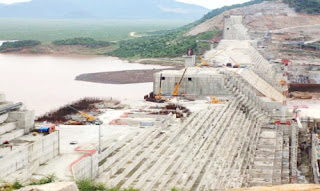Egypt-Ethiopia: Exercising trust
Speaking to Al-Ahram Weekly a few days after presenting his accreditation to President Abdel-Fattah Al-Sisi on 23 September, Tekle said he was keenly aware that his new posting will never escape the shadow cast by the Grand Ethiopian Renaissance Dam (GERD).
During the past two years Egypt and Sudan have strived hard to reach an agreement with Ethiopia over the filling and operation of GERD, the giant dam with a reservoir capacity of 74 billion cubic metres (bcm), that Addis Ababa is constructing on the Blue Nile.
A seemingly endless round of three-way negotiations, at first conducted independently, then in Washington with the mediation of the US and World Bank, and most recently via video-conference due to COVID-19, with South Africa, in its capacity as the current chair of the Africa, mediating, all ended without securing an agreement.
There is no clear roadmap for the future of negotiations. Since the last round of talks collapsed eight weeks ago Sudan has refused to resume negotiations in the absence of a clear pathway capable of ensuring movement towards a deal. Khartoum spurned an offer from Ethiopia to resume talks on 14 September. South Africa, meanwhile, has not put forward an alternative date for the resumption of negotiations.
Speaking to the Weekly, Tekle said that Ethiopian Prime Minister Abiy Ahmed has been in touch with his Sudanese counterpart Abdalla Hamdok in an attempt to find a way forward. “We are still waiting for Sudan,” he said. “We are hoping that there will be a date soon but we don’t know.”
South Africa’s presidency of the African Union ends in February, and nobody is holding their breath that the dispute will be resolved before Congo takes over at the helm of the AU.
Tekle says Addis Ababa appreciates the efforts South Africa has exerted to bring the three countries together without imposing any views.
“It is up to the three countries to decide what they will do and what they can agree on. It is not for any third part to decide on their behalf,” he says.
According to Tekle, Ethiopia is committed to reaching a negotiated agreement that, as Ethiopia’s prime minister has repeatedly said, will not inflict “significant harm” on Egypt.
Egypt, which already suffers from a shortage of water, depends on the Blue Nile for 80 per cent of its already insufficient share of Nile water. But while Cairo and Khartoum have been demanding a legally binding agreement that guarantees a minimum water flow, in the most recent round of talks Ethiopian officials talked only of setting rules and guidelines.
Tekle said that this remains Addis Ababa’s position, arguing that it is what was agreed in the 2015 Declaration of Principles that the three countries signed in Khartoum.
During this year’s wet season, from mid-July to mid-August, Ethiopia unilaterally began the first filling of the reservoir, withholding 4bcm of water. Tekle said it was fortunate because the volume of rain this year was much higher than usual.
“We would have wanted to have an agreement before the filling,” Tekle said, and argued that Ethiopia is just “holding water” during an excessively rainy season.
Asked whether Addis Ababa intends to pursue a second filling in 2021 in the absence of an agreement, Tekle says only that “we are hoping to get an agreement.”
Tekle spoke before the president of Ethiopia announced on Monday evening that the Ethiopian authorities will prevent civil aviation over the GERD area.
He sees his job as working to create an atmosphere that will help the process of negotiations, insisting he is here “to focus on the positives”.
One thing Tekle is keen to avoid is provoking any rhetoric that might hinder talks.
“It is a very delicate situation and we don’t want statements that negatively affect relations on either side,” he says. Instead, his focus is to promote cooperation between Ethiopia and Egypt across a range of sectors which he believes will help push forward a deal.
“Many friends told me I was coming to Egypt at a critical moment. What I told them was that I was arriving at a time when we need to work harder in order to achieve something.”
Tekle is convinced that Egypt and Ethiopia can overcome their current disputes and work towards the future. “We are linked spiritually, naturally and geographically. By better understanding each other we can overcome our differences.”
Trade, investment, tourism and education are all areas ripe for future cooperation, which Tekle believes will promote greater understanding an agreement over GERD.
Source: Ahram online




Comments
Post a Comment